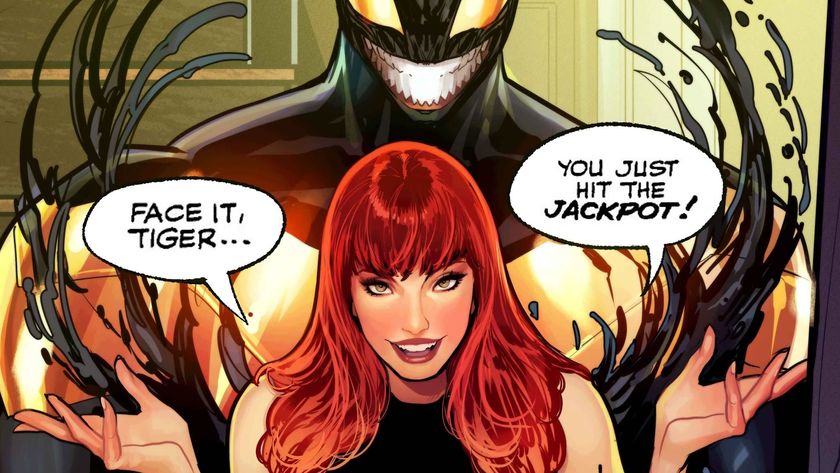The secret origin of J.M. DeMatteis
The man behind Justice League International and Kraven's Last Hunt tells us how he got started
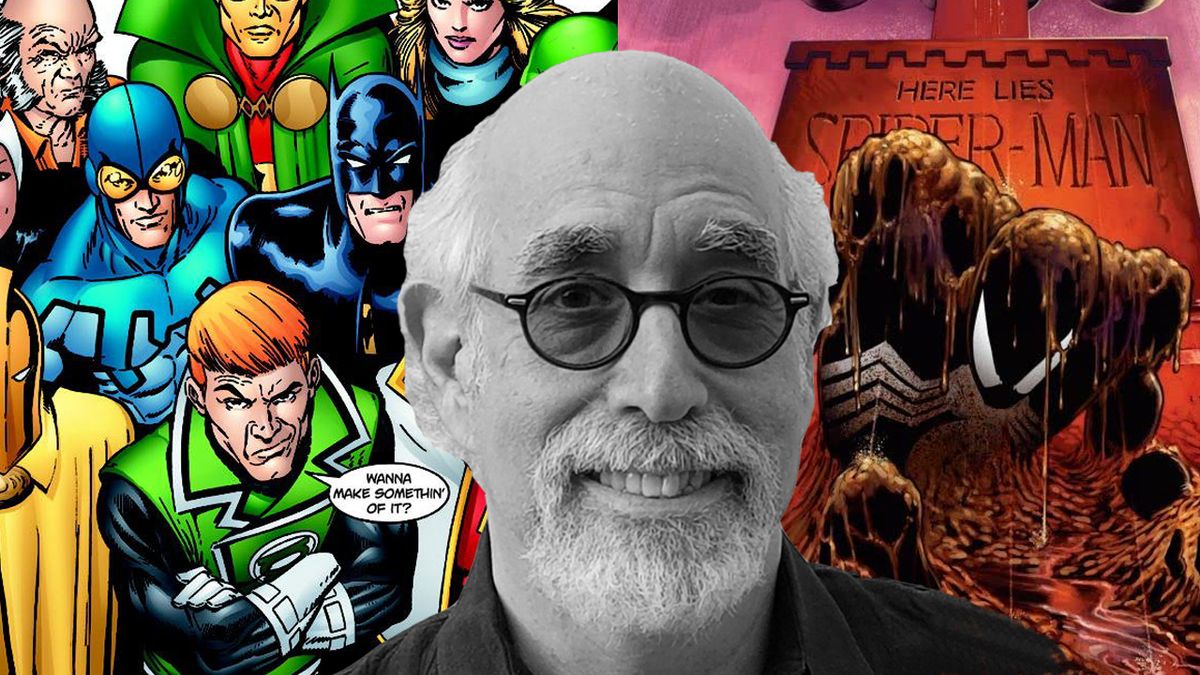
J.M. DeMatteis has created some of the most popular Spider-Man and Justice League stories in modern memory, but did you know he originally planned to be a musician and not a comics writer?
In his 40+ years in the industry, DeMatteis has created the seminal Spider-Man arc 'Kraven's Last Hunt,' helped steer the 'bwa ha ha!' era of the Justice League, and was the writer of one of the earliest major creator-owned success stories in Moonshadow.
As part of Newsarama's spotlight interview series 'The secret origin of...', we spoke with J.M. DeMatteis to learn about his early days as a comics fan, and how that interest blossomed and was forged into a career in the comic book industry.
Newsarama: Let's jump right in, what got you into reading comic books?
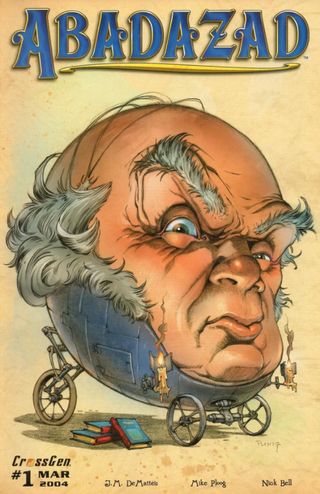
J.M DeMatteis: I don't remember a time when I didn't read comics. It seemed they were always around and I always loved them. They were just part of the kid culture when I was growing up.
Nrama: Do you remember the first comic book you ever read - or the first comic you specifically remember reading?
DeMatteis: I was probably reading comic strips before comic books. Getting the New York Times and the New York Daily News on Sunday mornings was a major ritual in my house and the News had a spectacular color comics section. That's where I first learned to love that magical combination of words and pictures.
Comic deals, prizes and latest news
Get the best comic news, insights, opinions, analysis and more!
In terms of actual comic books, I have a clear memory of a cousin of mine giving me a batch of comics and laying them out on the living room floor, staring at all the covers in awe and wonder. Pretty sure I was reading comics before that, but that particular moment has always stayed with me, so that may have been when I went from casual reader to comics addict.
Nrama: Was there a particular comic book that inspired you to become a writer?
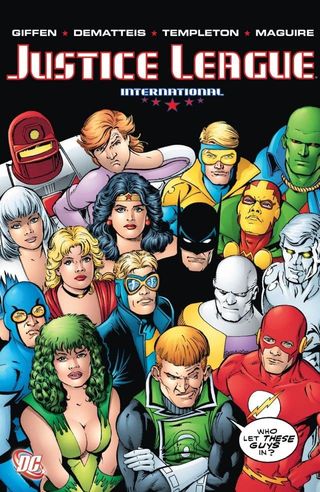
DeMatteis: No. In fact, my original goal was art, not writing. I spent a good part of my childhood sprawled out on the living room floor, drawing. After high school, I was accepted into the School of Visual Arts but (long story) ended up not going.
My other passion was music: playing guitar, writing songs, playing in bands. But storytelling was always part of that, whether it was creating my own comic book or crafting a song. And I always had a natural ability with words and enjoyed writing. So, I was always bouncing back and forth between art, music, and writing in some form.
Nrama: Did your background in music help you at all with your comic book writing?
DeMatteis: Not consciously, at first; but I've seen, over the years, how my musician's mind impacts and informs my writing. In my 'Imagination 101' writing workshop, I talk about the links between music and writing, comics in particular. In the beginning, I wasn't aware that I was doing it; but, in some ways, perhaps many ways, I write stories as a musician...if that makes any sense!
Nrama: Did you ever have to decide between a career path as a musician or comic book writer. If so, how did you choose?
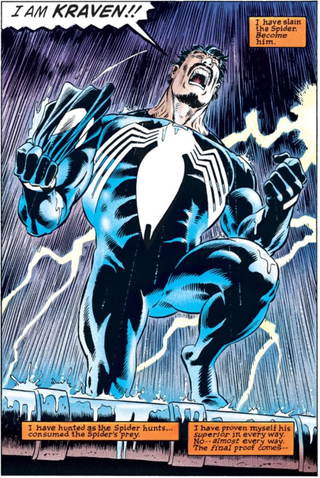
DeMatteis: What I came to realize - not consciously, at first, the decision was more intuitive - was that I didn't have the nervous system for the musician's lifestyle. I'm a guy who's most comfortable at home, cocooned in my own imagination. I think life on the road as a musician might have killed me. So, there was a point where a) the band I was in broke up and b) I started getting writing work, first as a music journalist, then in comics - and the writing soon became my primary path.
I still love music, still play, and write songs. (You can find my '90s album How Many Lifetimes? On Spotify, Apple Music, and other streaming platforms.) One of the most satisfying things I've been doing during lockdown has been making demos of a batch of recent songs, with an eye toward eventually going back into the studio to record again. So, music still brings me a very special kind of joy.
Nrama: What jobs did you have before deciding to do comic books full-time?
DeMatteis: Before comics, I was getting by - scraping by, actually - playing in bands, doing the occasional temp job (which I always hated; I wasn't made for the 9-to-5 world), writing music reviews.
I've been extremely lucky because I've been able to make my living all these years doing what I love. Living a creative life, being my own boss.
Nrama: How did you get your first gig writing comic books?
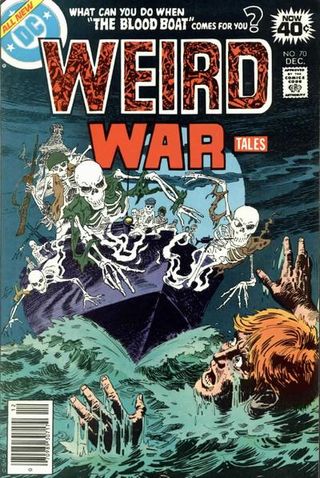
DeMatteis: A guy I knew in college, Warren Reece, was working in Marvel's production department, and through his good graces, I was able to sell a few pieces to Crazy, Marvel's Mad knock-off. I hoped that would get me an in with the comic book side of things, but it didn't. (It did get me a check with Spider-Man's picture on it, which was quite a thrill.)
Around the same time, I took a shot and sent some writing samples to DC Comics, and got a letter back saying Paul Levitz was looking for stories for the DC mystery books: anthologies like Weird War Tales, House of Mystery, House of Secrets. I wrote to Paul, sent him some ideas, which he eviscerated (and he was right!), but he ended his evisceration by saying "Feel free to submit again." Which I did. Again and again, till I sold him a story for House of Mystery. And that was what really opened the door for me.
Nrama: You've also worked in animation. What made you want to work in TV and for animated films?
DeMatteis: I never thought of myself as a comic book writer. I'm a writer, period - and that means telling stories in any and all forms. So, writing for TV and film was always a goal.
I sold my first TV script the same way I sold my first comic book script: I took a breath, took a chance, and wrote a letter. CBS was reviving The Twilight Zone and I read somewhere that Alan Brennert was one of the story editors. I'd never met Alan but I knew he'd written comics and so I wrote to him in care of the show and he was kind enough to reply. (Aside from being a brilliant, Emmy-winning writer, Alan is an incredibly nice guy.) It was a long process, but, thanks to Alan, I was able to sell a story to The Twilight Zone. Being a massive fan of the original Twilight Zone, you can imagine what a thrill that was.
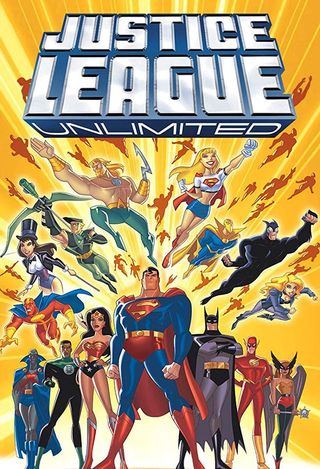
A few years later I was writing for the live-action Superboy show, which was produced by Stan Berkowitz. Stan and I became good friends, he went on to an award-winning career in animation and asked me to write an episode of Justice League Unlimited. I'd written a couple of animated episodes before then, but animation wasn't a passion, or a goal, at the time. But I had a great time writing for JLU (which remains one of the best versions of the JL ever done in any medium), they liked my work and kept giving me more assignments. That was what really sparked my love of writing for animation and it's been a huge, and hugely enjoyable, part of my career ever since.
Nrama: How was your work in TV and animation different than your time in comic books?
DeMatteis: Writing comics, even when you're writing iconic characters like Spider-Man and Batman, allows the writer a huge amount of freedom in terms of storytelling; you can really leave your unique, deeply personal, stamp on these characters. And the creative process is very intimate: It's really just you, the artist, and your editor. When you get into creator-owned comics, the freedom is total. It's you and the artist, creating worlds from the ground up with no one else in the way.
In TV, it's much more collaborative. They've got their season mapped out. The staff has certain beats they need to hit, certain stories they want to tell, and, as a freelancer, I'm there to help execute that vision. I'm one part of a large team—so I take off my 'personal vision' hat and put on my 'team player' hat. The paradox, of course, is that, while I'm executing their vision, I have to make it personal, I have to bring as much of myself and my unique POV to the material. So, it's really about finding a middle ground where I serve their vision with my own voice.
Considering how much time I spend alone in a room with my imaginary friends, it's been a genuine pleasure spending hours and hours talking story with people like Stan, the late great Dwayne McDuffie, Jim Krieg, Bruce Timm, James Tucker, Alan Burnett, Michael Jelenic, Kevin Burke, 'Doc' Wyatt. (To name a few.) These are guys who are first-rate writers, who really understand story - so it's always an interesting, exciting time putting these things together with them.
In recent years, most of what I've done has been in the arena of DCAU movies -Superman: Red Son and Deathstroke: Knights & Dragons being the most recent -and the process is similar. But, since we're dealing with stand-alone stories, as opposed to one episode of an ongoing series, there's even more room for me to leave a personal imprint on the material. But it's always a collaboration with the producers, story editors, directors, etc. Everyone's creatively feeding into the project and the final product reflects that.
Nrama: How did your skill in writing comic books help you as a screenwriter/TV writer?
DeMatteis: Story is story is story. The mode of expression is different - so that story will play differently in a comic book, a screenplay, a novel. But the essence of what makes a great story remains the same. You can apply that to any medium.
Nrama: What story are you most proud of from your collection of works?
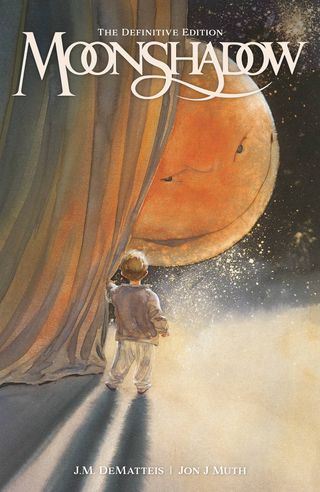
DeMatteis: I've been doing this for 40 years, so it's impossible to winnow it down!
Favorites that spring immediately to mind are: Moonshadow with Jon J Muth. Brooklyn Dreams with Glenn Barr. Abadazad with Mike Ploog. The Life and Times of Savior 28 with Mike Cavallaro. My many collaborations with Keith Giffen, especially Hero Squared. My years of Spider-Man work, especially 'Kraven's Last Hunt' with Mike Zeck and Bob McLeod, and my Spectacular Spider-Man run with Sal Buscema. The Doctor Fate run with Shawn McManus. There are so many other projects that are near and dear to my heart and I've been so incredibly lucky to work with some of the best artists in the business, too many to mention here.
And, of course, I'm still at it: At the moment, I'm developing four new creator-owned comics, in discussions about a new animated movie, I'm bringing my writing workshop online - so it really never ends. And I'm so profoundly grateful for that.
DeMatteis and others recently walked with Newsarama down memory lane in revisiting the seminal 'Kraven's Last Hunt' Spider-Man arc.
Kat has been working in the comic book industry as a critic for over a decade with her YouTube channel, Comic Uno. She’s been writing for Newsarama since 2017 and also currently writes for DC Comics’ DC Universe - bylines include IGN, Fandom, and TV Guide. She writes her own comics with her titles Like Father, Like Daughter and They Call Her…The Dancer. Calamia has a Bachelor’s degree in Communications and minor in Journalism through Marymount Manhattan and a MFA in Writing and Producing Television from LIU Brooklyn.


